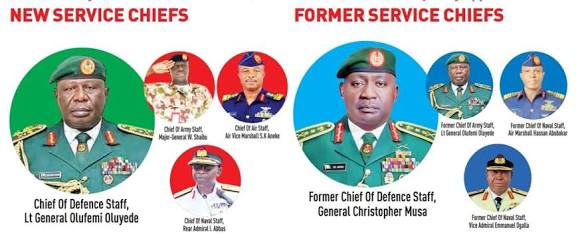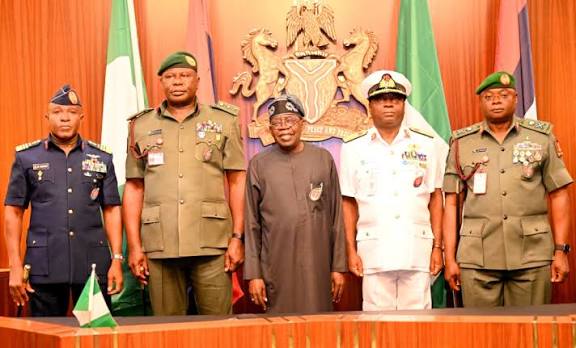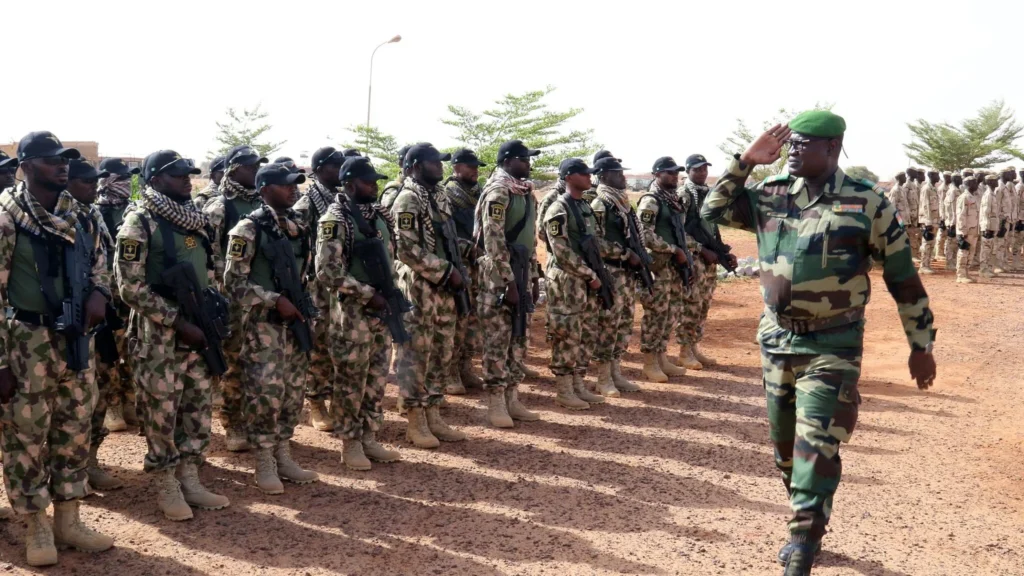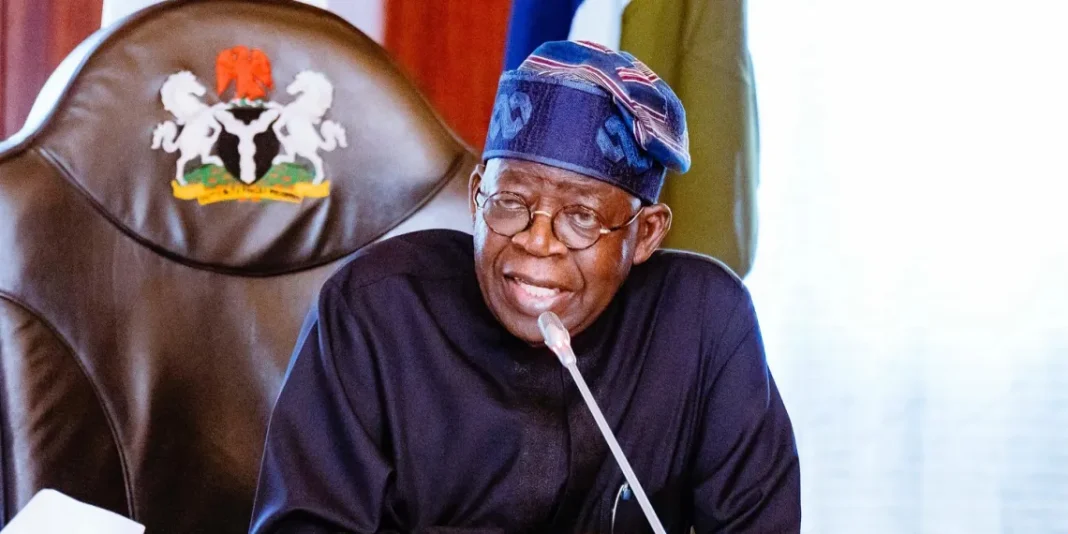The President of Nigeria and Chief Commander of Armed Forces, President Bola Tinubu has replaced Nigeria’s service chiefs, following a reported coup plot and secret detentions.
Described as an effort to “strengthen Nigeria’s national security architecture,” the move came after weeks of probing alleged coup plots in the country which involved 16 senior military officers.
Signed by Special Adviser to the President on Media and Public Communication, Sunday Dare, the presidential announcement named General Olufemi Oluyede as the new Chief of Defence Staff, replacing General Christopher Musa.
Other new appointees included Major-General W. Shaibu as Chief of Army Staff, Air Vice Marshal S.K. Aneke as Chief of Air Staff, and Rear Admiral I. Abbas as Chief of Naval Staff.
However, Major–General E.A.P. Undiendeye retained his position as the Chief of Defence Intelligence(CDI)—the reason being that the Defence Intelligence Agency (DIA) which he leads, is currently implicated during the investigation of the alleged coup plotters.
Recall that the Nigerian army had earlier commenced the probe of nothing less than 20 military officers after they were detained in relation to an alleged unsuccessful coup.
The perpetrators who had tentatively picked a date to execute the military takeover, were still undergoing continuous consultation to overthrow President Tinubu when their conspiracy leaked.
The controversy stemmed from reports that 16 military officers from the Army, Navy, and Air Force, attached to the Office of the National Security Adviser (ONSA), have been held incommunicado by the DIA for over three weeks. Family members, who initially feared their relatives were kidnapped, confirmed the detentions, expressing concern over the lack of official communication or access to the officers.

Nigeria Presidency Was Slammed of Skepticism
While the presidency donated his gratitude to the servitude of the sacked officers, imploring the new appointee to uphold professionalism in their dealings, the president’s decision has intensified speculation of rising distrust within the armed forces.
Therefore, Nigerians and experts have slammed the government, accusing Tinubu’s administration of double–speaking, and intentional distortion of the public trust.
Babatunde Akintunde, the Executive Director of the Centre for Journalism Innovation and Development (CJID) bemoaned the government’s earlier contrast with the media, saying: “This is coming after denying there was any ‘coup attempt’ while accusing the media of spreading disinformation. When we are done deceiving ourselves, we will face reality.”
From his own side, Kolawole Adekunle remarked: “But the army firstly denied it, so everything you people and the APC government have been denying is hundred percent true.”
Reaffirming the same sentiment, the African Democratic Congress (ADC) has blamed Tinubu’s government for the earlier denial of the coup attempt, framing the denial as “confusing and evasive” handling of the matter—misleading citizens with mixed signals instead of the much–needed clarity.
Demanding the President to unveil the motivation behind the sudden removals, the political party deemed Nigerians to deserve full transparency amid speculation of political stability during the ongoing administration.
“The reactions of the government to the dangerous rumors have veered between deliberate obfuscation and outright confusion in a matter that required crystal clarity,” said Bolaji Abdullahi, the party’s National Secretary General, while releasing a statement on behalf of the party on Friday.
Challenging the DIA’s action in detaining the alleged coup plotters, a security expert and former military officer slammed the agency for overstepping its mandate. Therefore, he argued that the crackdown appeared selective and politically motivated.
“In the military, if an army officer offends, he is to be charged by the Nigerian Army directly…We want to know when the DIA started handling cases of indiscipline.”
“Why only 16 officers? Why pick from all three services and then hand them over to the DIA? This doesn’t follow standard military procedure.”
The New Service Chiefs, Who?
Major–General Waidi Shaibu, the newly appointed Chief of Army Staff, previously headed a joint–task force in Northeastern Nigeria, served as the Theatre Commander for Operation Hadin Kai (OPHK).

Renowned for his leadership in the fight to uproot insurgency in Nigeria, he boasted major operational triumphs and community support initiatives in Borno State, serving as the General Officer Commanding (GOC) 7 Division.
Immediately before his new appointment, Major–General Shaibi served as the Deputy Commandment at the National Defence College, before later moving to the Defence Space Agency after handing over command in April 2025.
For the Chief of Naval Staff, Rear Admiral Idi Abbas, had formerly served as the Chief of Naval Safety and Standards from June 2023, after his role as Director of Operations at Naval Headquarters.
Mr Abbas was trained at the Amphibious Warfare School, US Marine Corps University, holding an MSc in Strategic Studies from the University of Ibadan, which he obtained during his National Defence College Course 22.
As a member of the 26th Regular Course of the Nigerian Defence Academy, he was promoted to the position of sub–lieutenant in 1983.
As Base Operations Officer of NNS PATHFINDER, Mr Abbas has successfully coordinated anti–illegal bunkering operations that significantly fight maritime crime. His extensive naval career includes service aboard NNS AMBE, NNS ARADU, and NNS EKUN and participation in ECOMOG operations in Liberia in 1996.
On the side of Air Vice Marshal S.K. Aneke, the new Chief of Air Staff, born on 20 February 1972, Mr Aneke had served as the Air Officer Commanding (AOC), Tactical Air Command, Makurdi. He also previously served as the Air Officer Commanding AOC of the Nigerian Air Force’s Mobility Command.
‘Coup Wave’ in Africa
Following Madagascar’s successful military intervention in running the government, Nigeria’s recent controversy has deepened the growing concern of power interruption, raising critical questions if African democratically elected leaders can maintain their power in the generations to come.

From Gabon to Niger Republic, Mali to Burkina, and down to Madagascar, military personnel have successfully shifted their main responsibility of safeguarding the country into political affairs.
The political crisis has escalated most recently in Gabon, where soldiers annulled election results and placed President Ali Bongo under house detention. This pattern echoes the July coup in Niger, which ousted a democratically elected president and triggered threats of military intervention from the West African bloc, ECOWAS.
Several handful of failed attempts such as the case of Nigeria have further exacerbated the crisis, with research underscoring the striking feature of the African coups, especially among the coup leaders as a causative factor of desire to uphold power as long as possible.
These events have prompted a forceful response from continental bodies. The African Union (AU) has consistently suspended member states following unconstitutional changes of government, emphasizing that the “rule of law must prevail over the rule of force.” ECOWAS has imposed severe sanctions on junta-led countries in an effort to restore constitutional order.
Despite military powers consistently citing corruption, economic mismanagement, and worsening security as justifications for overthrowing governments—promising transitional periods leading to new elections, their promises represent a paradox, with timelines being often extended, prolonging military rule.
The repeated suspensions and diplomatic pressure highlight a critical battle for governance norms in Africa, as continental leaders strive to reverse a dangerous backslide towards militarized power.

